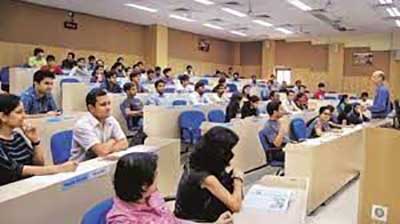Relevance: GS-2: Issues Relating to Development and Management of Social Sector/Services relating to Health, Education, Human Resources;
Key Phrases: contextualising and reimagining education, Blended Education; holds High Empowerment Potential, DESH Stack e-Portal
Why in News?
- In this year’s budget speech (2022-23), the finance minister announced
the intent to create India’s 1st central digital university
- Also, the launch of DESH Stack e-portal will provide a digital ecosystem to the budding Indian talent in order to skill, reskill and upskill. This will aid in utilising demographic dividend.
Key Highlights of the Article
- The government’s vision of a digital university to reach all students across the country, with its promise of personalised teaching at the doorstep, should be considered a landmark step in Indian education.
Status of Digital University in India
- There are 2 universities in India which are digital
- The 1st one was established in Kerala by upgrading IIIT-K (Kozhikode)
- The 2nd one has been established at Jodhpur
- The launch of Havardx (which offers free online courses from Harvard
University) and Edx (a massive open online course provider by Harvard and
Massachusetts Institute of Technology), saw enrolment of Indian students for
Edx second only to that of US students.
- However, sadly only 16% of students completed these ‘digital only’ courses.
Challenges of Digital Education
Piramal Foundation’s own experience of working with about 2 million students and 700,000 educators during the pandemic has helped us see the lacunae in a digital-only approach.
- Problems for students
- They struggle in their transition to online learning,
- They feel demotivated in the absence of a mentor or peer group, and
- They also struggle with tests and assignments.
- Problems for Teachers
- They struggle with producing online content
- They also find it difficult to keep children engaged.
‘Phygital model’ to rescue
‘Phygital’ model that combines online course instruction with weekly or fortnightly in-person educational sessions.
- Phygital education makes it easier for students
- To transition to learning online,
- Stay motivated to complete their courses and also
- Complete their tests and assignments.
- Phygital education also helps teachers
- Keep students engaged,
- Read behaviour patterns among them that may be of relevance, and
- Tailor their delivery accordingly.
But apart from this, we will need many more components in order for it to be truly inclusive and game-changing.
Way Forward
- Employ a learning management system that is multilingual and
accessible:
- Language barriers are a key challenge to online learning in our country, with such vast diversity of languages and dialects.
- Videos and frequently asked questions (FAQs) are primarily in English, and students struggle with access, navigation, understanding and synthesising content.
- The website interface, applications, support and content for digital learning need to be made available in prominent regional languages.
- These need to be inclusive in other ways as well, keeping in mind the needs of people with disabilities, so that all learners embark on their learning journey with confidence.
- Enable the adoption, retention and completion of courses:
- Students are overwhelmed with creating online accounts and filling and uploading complex documents, and all this adds to their confusion about using applications.
- Fixing this requires building their digital literacy through simple, concise learning modules on how to operate a device and engage with a digital platform.
- Providing on-call support with minimum wait time via call centres, chatbots, etc, will help them overcome teething issues.
- Create engaging, immersive learning experiences:
- Shared teaching-learning experiences that have dipped because of the use of a virtual interface can be rebuilt by promoting a spirit of competition through periodic contests and events which rate performance and boost student motivation levels.
- A weekly in -person interaction between teachers and students will further enhance the experience for both.
- Link peer learners to create strong learning communities:
- One of the big challenges in digital education is the absence of a peer network.
- Students cope with the difficulty of studying alone, coupled with the boredom of online education, which can lead to discontinuity and drop-outs.
- Creating peer learning communities and linking groups of 3-5 students who are located in the same geographical vicinity will bring back joy, while fostering healthy competition and cross-learning.
- Improve the quality of instruction on digital platforms:
- Teachers face unique challenges with infrastructure required to teach online, an inability to adapt to the virtual-lecture mode, especially in the face of poor attendance and lack of real-time student feedback.
- Educators need to be supported in creating hygiene-checked content and regularly assessed to raise their competence levels.
- Additionally, curriculum frameworks need to be developed that encourage the creation of competency-based micro modular courses.
Conclusion
- Phygital education has the potential to transform education in India. It is the future because it contextualises and reimagines education. However, we need to put in place an enabling environment that makes students and teachers feel comfortable and confident navigating this space in their own language. Blended education opens up immense opportunities for capacity building among frontline workers. It holds high empowerment potential because it can enable adults, especially women, to resume education. Phygital education can serve as an engine of economic growth and a transformative force that empowers every Indian.
Source: Live Mint
Mains Question:
Q. Phygital Education has gained the roots but challenges accompanying it are to be addressed soon for it to bear fruits. Elucidate.







